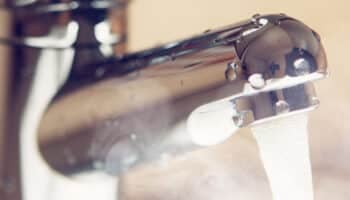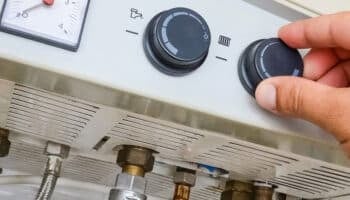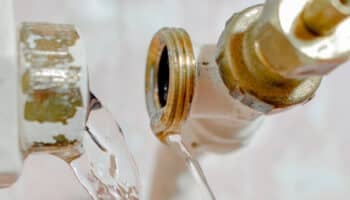We've independently reviewed this article to make sure it's as accurate as we can make it.
To find out more about our article creation and review process, check out our editorial guidelines.
A water heater that runs constantly is not only a nuisance, it can also be dangerous.
Your water heater can be running up your utility bill if it’s always running. It could be a sign that your water heater is also old and in need of replacement. Fixing your water heater is easy to do at home if the problem is just a simple leak.
The first thing you want to do is check for leaks. Some leaks are easy to fix on your own and come down to tightening loose pipes and connections. Other problems require the assistance of a specialized technician in order to safely prepare your water heater.
Let’s jump into tackling your water heater woes by taking a look at the equipment we will need for these repairs.
What You’ll Need
You might be surprised to learn that you won’t need that many tools to fix your water heater. That’s because a water heater that is constantly running is typically caused by leaks which can be fixed just by tightening certain fixtures. However, there are more complicated problems that will require specialized repair from a technician.
- Towels
- Wrench Set
- Channel Locks
- Pipe Tape
- Water Heater Insulation
Fixing A Water Heater That’s Always Running
Now let’s take a quick look at 6 of the easiest ways that you can repair your water heater on your own.
#1 Search for Leaks
The first step in fixing your water heater is to search for leaks. You want to assess the outside of the water heater to see if you can spot any leaks.
Your search is going to start at the base of the water heater. If you notice water pooling up anywhere around the base, then you’ve got a sure sign of a leak. Leaks can also appear at the top of the water heater or on the back or sides where the water intake pipes are attached to the tank.
If you find a leak, then you’re good to move on to our next step. However, if you don’t find any leaks around your water heater, then it might be time to get in touch with a professional. Leaks are easy to fix on your own while other problems require more specialized repairs.
#2 Check the Temperature Pressure Relief Valve
The temperature pressure relief valve has a very important job in your water heater. This valve vents pressure if it grows too high inside of your water heater. This valve is designed to prevent a critical failure which could lead to an explosion.
If the valve is too loose, your water heater can start to leak from the point where the valve connects to the tank. This valve should be on the top of your water heater. If you spot water leaking out from anywhere around your temperature pressure valve, and you found your solution.
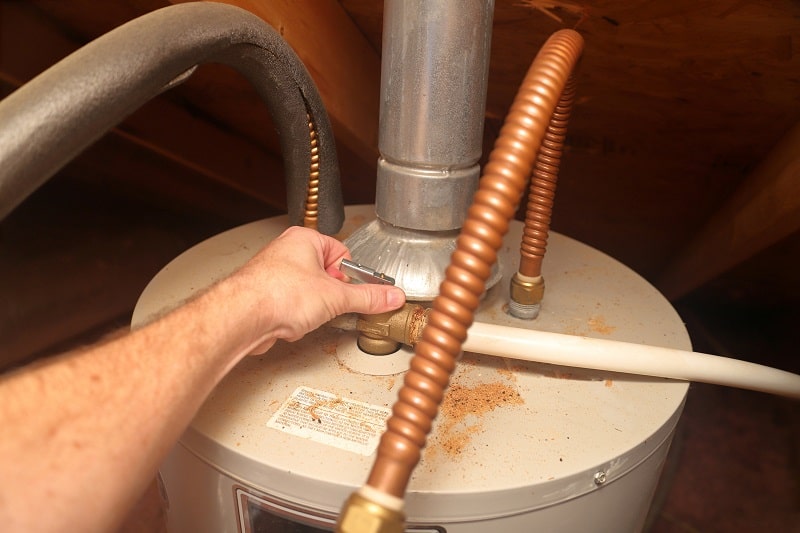
All you need to do is use a wrench to tighten your temperature pressure valve. You can use a towel to clean up any excess water that has leaked around your water heater.
#3 Check the Water Pipes for Fit
There are two sets of pipes bringing water into and out of your water heater. It’s very common for these pipes to leak over time. You’re home, and we’ll be settling and its foundation over the years and this can slowly move your water heater out of alignment.
You want to check these pipes for leaks both at the point where they connect with your water heater as well as further down the line. A leak anywhere in this system will lower the amount of water getting into, or leaving, your water heater. This will cause your water heater to work overtime.
If you find there’s a leak in these pipes, then often we just need to tighten the connections.
However, this is easier said than done!
There’s a bunch of different types of plumbing pipes with their own methods of connecting, crimping, threading, etc. Do your best to tighten the connections with a wrench, but if you get stuck, it might be worth searching online for more specific advice on that type of connection.
Pipe tape can also help you make sure that there is a secure connection between one pipe and another. Pipe tape isn’t applied on the outside of the pipe, but on the inside of the pipe on the threading. This helps prevent leaks in the threading and ensures a strong connection from one pipe to another.
Other tools like Plumber’s Putty can also be a great quick fix here.
#4 Water Heater Insulation
The job of your water heater is to, well, make sure that your water stays hot. If your water heater can’t retain the temperature that’s bringing your water up to, that’s going to have to run constantly to reheat the water. You can fix this problem very easily by adding some insulation to your water heater.
This insulation will help your water heater retain its temperature for a longer time. This helps to ensure that your water heater is not running constantly in order to reheat water.
You can find water heater Insulation at your local hardware or home goods store. Different brands of insulation will attach using different systems. Some require tape while others use adhesive shoes and there are even other brands that require you to use a tie or a fastener to connect the insulation to the water heater.
#5 Water Heater Sediment
Sediment can build up inside of the base of your water heater tank. This can have a pretty dramatic effect on your water heater’s ability to generate hot water. The more sediment that builds up, the more clogged your pipes are going to get and the less room for hot water there’s going to be in the tank.
This can cause your hot water heater to run constantly to keep up with demand. You can think about it this way. All of that sediment is taking up space that should be there for hot water and hot water alone.
Each water heater is going to have a different set of instructions when it comes to draining the tank and removing sediment. Your owner’s manual should be able to walk you through how to drain your water heater tank and remove sediment in a safe manner. If you are uncertain about draining sediment from your hot water heater, in touch with a home repair technician to have them lend you a hand.
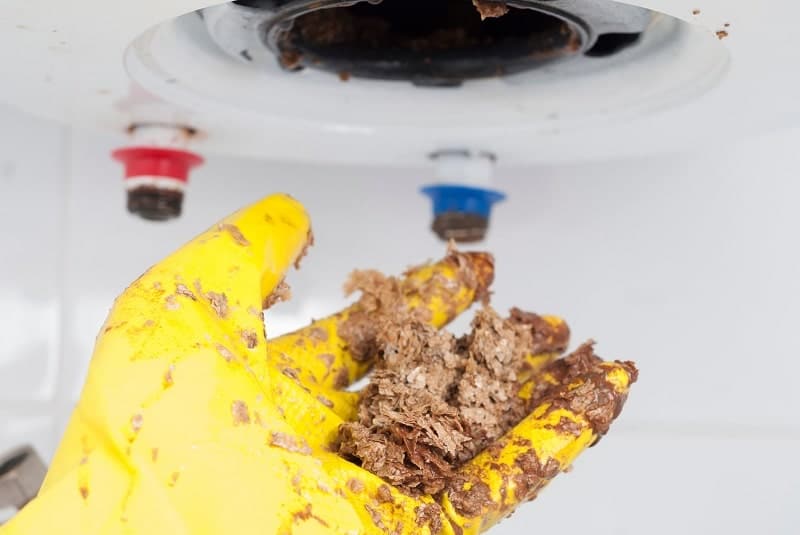
#6 Old Water Heater Tanks
Hot water tanks don’t last forever. Your hot water tank is designed to last for somewhere between 10 to 20 years. We recommend having a specialist inspect your hot water tank once a year after that 10-year mark. This will help prevent any unexpected surprises such as losing hot water in the middle of winter.
Sometimes an old water heater just can’t be fixed. The types of leaks that old water heaters face are much more serious and can be nearly impossible to repair. It could also be the case that the repairs on your old water heater equal the cost of upgrading to a newer model.
It’s good to update your water heater within that 10 to 20 year mark. This will help you prevent any more serious problems that pop up along the way. It’s much easier to replace a clunky water heater than it is to clean up the damage after your water heater cracks and floods your basement.
Water Heater FAQ
Your water heater shouldn’t be a mysterious part of your home against your head scratching. Here are answers to some of the most common questions about faulty water heaters.
What Makes Hot Water Run Constantly?
Leaks are the number one source of a hot water heater running constantly. As your hot water heater ages, the gaskets and seals can wear down which leads to leaks. Other problems that can cause your hot water heater to run constantly include backups, too much demand on an old system, and your hot water heater being out of date.
What Are The Signs Your Water Heater is Going Bad
There are a few common signs that your water heater is past its prime. The most obvious sign is that your home no longer has enough hot water. You should also keep an eye out for a change of color in your hot water, hot water taking on any smells, or signs of leaks or damage around your water heater.
Can My Water Heater Explode?
Your water heater can explode. Water heaters operate under immense pressure and if not properly kept up, they can experience critical failure. It’s also common for water heaters to rupture which can cause serious injuries.
Wrapping Up Fixing Your Water Heater
The best way to repair your water heater is to make sure you stay up to date on your yearly water heater inspections. These inspections are the best way to stay ahead of these pesky problems that slowly build up over time. Let us know which of our solutions works for you. Check out other DIY home repair tips in the articles below.





